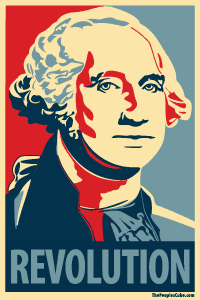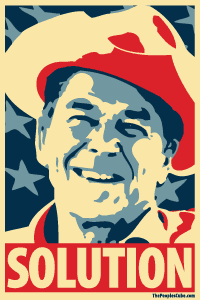By Daren Jonescu | May 19, 2012 | American Thinker
The primary reason why it is so difficult to defend political liberty today is because freedom is a rational construct, and thus cannot be understood by the irrational. Children, or adults whose moral reasoning skills are stalled at childish levels, are unable to experience it — they literally don’t know what they are missing.
This is why authoritarians of all stripes are hell-bent on producing and maintaining a society of childish citizens: dependent, trusting of the hand that feeds, obedient, pleasure-centered — perhaps capable of proficiency in well-defined tasks, but frightened, above all else, of being left to “fend for themselves.”
In short, individual freedom, in the complex sense captured in the most profound political philosophy, is completely inaccessible to a mind without a developed faculty of practical reason. And a moral concept that cannot be understood rationally cannot be deeply experienced emotionally. What does freedom feel like? What, conversely, does the deprivation of freedom feel like? Those who hope to restore freedom to the civilized world must first win the educational battle that would make those two feelings, and the difference between them, immediately accessible to every adult.
For there is no hope of winning a debate over the best means of securing liberty with an opponent who cannot understand what difference it makes whether health care is “provided” by private citizens or by the government, why some people should be “allowed” to be wealthy when others are poor, or why anyone who believes in Christian charity would oppose government programs that “take care of people.” You might as well argue about driving technique with someone who has never seen a car.
One can read Aristotle, Aquinas, and Locke until the cows come home without ever feeling what freedom means. (The world’s universities are full of political experts for whom the penny never drops.) That feeling is the surest safeguard of political liberty, and the most powerful weapon in the struggle against oppression. But it can be experienced only by those whose minds and characters have matured along with their bodies.
Consider the analogous case of justice. It is possible that every child has an innate sense of “justice” — but it is not justice as an adult understands it, because it is imbued with a child’s moral myopia, in which his own existence and immediate surroundings are the basis of all reality. Justice, as a child experiences it, primarily means that he gets what he thinks he has coming, regardless of how this might affect anyone else, or even himself in the long run.
Responsible parents and teachers of young children correct the behavior of their charges with admonitions such as “Imagine how you would feel if he did that to you,” “You can have that if you finish your work first,” or “That’s not yours.” These elders are trying to encourage the development of the concepts that make an adult sense of justice possible: respect for the independent existence of other people, a sense of the natural equality of moral worth, and an understanding that everyone should have what he has earned and deserves first claim on what he has.
What if, on the other hand, the parents themselves are observably unwilling to respect the wishes, moral dignity, or possessions of other people, and if the teachers substitute indiscriminate “sharing” for fairness, and “fitting in” for moral equality? Then the most likely product of their influence will be precisely today’s increasingly dominant moral tenor: a belief that one’s desires impose material obligations on the world, a refusal to acknowledge the moral claims of others when these conflict with one’s desires, and a complete disregard for the basic concept of a man’s possessions as the rightful fruit of his labor. In other words, adults with the moral sophistication of toddlers.
Now consider the case of political freedom. As a child experiences it, freedom means being permitted to do something by those who hold authority (parents, teachers, babysitters, etc.) — and, more positively, it means doing what one feels like doing, without fear of adverse consequences. The immaturity of impulses, and the inability to conceive of one’s long-term well-being, or to calculate the appropriate means to achieve it, are the reasons why children need adult supervision and guidance. They are not ready for the true freedom of which they cannot yet conceive.
Read the full article here.
Related Articles
- On Restoring American Individualism (johnmalcolm.me)
- Progressing toward Moral Darkness (americanthinker.com)
- Freedom (alternateeconomy.wordpress.com)
- United States Catholic Bishops on Our First Most Cherished Liberty (credointhecommunionofsaints.wordpress.com)
- Everything Is A Lie – The Deliberate Intent To Deceive People Is At An All Time High (powersthatbeat.wordpress.com)
- The illiberal nature of modern liberalism (jdstmporter.wordpress.com)
- The Deliberate Dumbing Down of America by Charlotte Thomson Iserbyt (FREE PDF BOOK DOWNLOAD) (matricalietuvoje.wordpress.com)
- The Global War on Children, part 1: Physical and Mental Health Assault (activistpost.com)
- How the Conservative Worldview Quashes Critical Thinking – and What That Means For Our Kids’ Future (tleonidas.wordpress.com)
- The Ultimate History Lesson: A Weekend with John Taylor Gatto (Parts 1-5 With Transcript) (johnmalcolm.me)
- Episode 219 – Three Debates That Will Blow Your Mind (corbettreport.com)
- John Taylor Gatto on lessons (thinking8.wordpress.com)
- The Origin and Evil of Compulsory Schooling (lewrockwell.com)
- 9 Assumptions of Modern Schooling (5ptsalt.com)
- Dumbing us Down (upspiral.wordpress.com)
- Government indoctrination centers exposed by insider (trutherator.wordpress.com)
- How to Control Society: Education and “National Security” (corbettreport.com)
- 12 Things Really Educated People Know (mikekato.wordpress.com)
- The Educational System Was Designed to Keep Us Uneducated and Docile (12160.info)
- Dumbing Down America – Intentionally (rawlivingfoods.typepad.com)
- “How to Train Fleas?” John Taylor Gatto, a sample from The Ultimate History Lesson (antioligarch.wordpress.com)
- A Very Profitable, Very Destructive Monopoly (lewrockwell.com)
- IndoctriNation’ Wins Best Documentary Award on the Eve of Another School Tragedy (faithinspires.wordpress.com)
- Brett Veinotte on Horrors of State-Run Schools and Schooling (pilgrimpassing.com)
- How Children Fail, a book by John Holt (wherein.posterous.com)









[…] You Cannot Miss What You’ve Never Had: The Vanishing Feeling of Freedom (johnmalcolm.me) […]